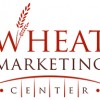
The Wheat Marketing Center (WMC) is one of the technical crossroads of the international wheat industry, providing technical training and grower workshops, innovative research, product development, and crop quality testing services. WMC focuses on promoting U.S. wheat by demonstrating its quality and functionality in Asian noodles, crackers and biscuits, tortillas and flatbread, and other baked products.
Pilot scale production lines (pictured above), state-of-the-art quality testing equipment, and rich technical expertise provide great value to our state wheat commission partners, wheat industry stakeholders, and millers and food manufacturers around the world. Another busy week for Wheat Marketing Center. The Governance and Finance Committees meet on Monday.
Janice provides a program update to the Montana Wheat and Barley Committee on Tuesday. CQ presentation videography starts on Wednesday and continues into next week. And we have a major proprietary cracker project underway. Thanks to all the staff for their hard work completing the crop quality project and meeting all the deadlines.
Pilot scale production lines (pictured above), state-of-the-art quality testing equipment, and rich technical expertise provide great value to our state wheat commission partners, wheat industry stakeholders, and millers and food manufacturers around the world. Another busy week for Wheat Marketing Center. The Governance and Finance Committees meet on Monday.
Janice provides a program update to the Montana Wheat and Barley Committee on Tuesday. CQ presentation videography starts on Wednesday and continues into next week. And we have a major proprietary cracker project underway. Thanks to all the staff for their hard work completing the crop quality project and meeting all the deadlines.
Services
The Wheat Marketing Center (WMC), located in the historic Albers Mill Building in Portland, Oregon, acts as a bridge between wheat growers and customers.
WMC is a technical crossroads of the wheat world linking wheat producers, millers, end product manufacturers, and consumers.
Consumer tastes are evolving in domestic and international markets; WMC's programs demonstrate how U.S. wheat can be used to meet changing consumer demand with products that are nutritious and cost competitive.
WMC focuses on promoting U.S. wheat by demonstrating its quality and functionality in end products, including Asian noodles, crackers and biscuits, tortillas and flatbread, and many other baked goods.
WMC is a technical crossroads of the wheat world linking wheat producers, millers, end product manufacturers, and consumers.
Consumer tastes are evolving in domestic and international markets; WMC's programs demonstrate how U.S. wheat can be used to meet changing consumer demand with products that are nutritious and cost competitive.
WMC focuses on promoting U.S. wheat by demonstrating its quality and functionality in end products, including Asian noodles, crackers and biscuits, tortillas and flatbread, and many other baked goods.
The Wheat Marketing Center's (WMC's) Visiting Scholar program invites wheat-focused science professionals from key international markets to spend up to 12 months to gain technical knowledge about U.S. wheat.
Technical exchanges not only strengthen relationships and create networks with current and emerging technical leaders but also build foundations for better recognition of the comparative advantages of using U.S. wheat in existing and new product markets.
Scholars have come from many key markets, including Japan, Taiwan, Mexico, China, the Philippines, and South Korea.
Technical exchanges not only strengthen relationships and create networks with current and emerging technical leaders but also build foundations for better recognition of the comparative advantages of using U.S. wheat in existing and new product markets.
Scholars have come from many key markets, including Japan, Taiwan, Mexico, China, the Philippines, and South Korea.
The Analytical Lab is the first step in understanding the complex issues comprising wheat quality.
Here, technicians utilize state-of-the-art equipment to test grain, flour and dough quality.
Looking at the results will help answer questions about how the wheat will perform when milled and made into end products.
Crop quality - Samples are collected and evaluated at harvest to inform growers and customers about the current crop.
WMC also participates in national programs to test new wheat varieties being considered for release.
Here, technicians utilize state-of-the-art equipment to test grain, flour and dough quality.
Looking at the results will help answer questions about how the wheat will perform when milled and made into end products.
Crop quality - Samples are collected and evaluated at harvest to inform growers and customers about the current crop.
WMC also participates in national programs to test new wheat varieties being considered for release.
The Buhler Experimental Mill is the most popular laboratory scale flour mill.
It facilitates our evaluation of smaller wheat samples for milling quality and produces white flour for flour, dough, and end product testing.
The Miag Multomat Mill is a pilot scale flour mill that can mill up to 600 lbs of wheat in a day.
The output of the mill is more closely related to a large scale industrial mill.
It produces ten white flour streams for research purposes.
The Engsko Stone Mill is the most recent addition to our milling equipment (and thanks to the Montana Wheat and Barley Committee for its financial support.)
It facilitates our evaluation of smaller wheat samples for milling quality and produces white flour for flour, dough, and end product testing.
The Miag Multomat Mill is a pilot scale flour mill that can mill up to 600 lbs of wheat in a day.
The output of the mill is more closely related to a large scale industrial mill.
It produces ten white flour streams for research purposes.
The Engsko Stone Mill is the most recent addition to our milling equipment (and thanks to the Montana Wheat and Barley Committee for its financial support.)
The Idaho Wheat Commission (IWC) is a not-for-profit, quasi-state agency established in 1959 through the efforts of the Idaho Grain Growers Association.
The IWC was created to help maximize profitability for Idaho wheat producers by investing funds in market development, research, and grower education.
The Wheat Marketing Center receives funding annually from the IWC.
The IWC collects a tax, or check-off, on bushels of wheat (3.5 cents per bushel) at the first point of sales.
Those dollars are reinvested in a variety of programs which include: research projects, which help develop wheat varieties with increased yields and protection from pests and diseases; overseas markets development; and educational workshops, export and domestic marketing tours for growers and legislators.
The IWC was created to help maximize profitability for Idaho wheat producers by investing funds in market development, research, and grower education.
The Wheat Marketing Center receives funding annually from the IWC.
The IWC collects a tax, or check-off, on bushels of wheat (3.5 cents per bushel) at the first point of sales.
Those dollars are reinvested in a variety of programs which include: research projects, which help develop wheat varieties with increased yields and protection from pests and diseases; overseas markets development; and educational workshops, export and domestic marketing tours for growers and legislators.
Reviews

Be the first to review Wheat Marketing Center.
Write a Review




